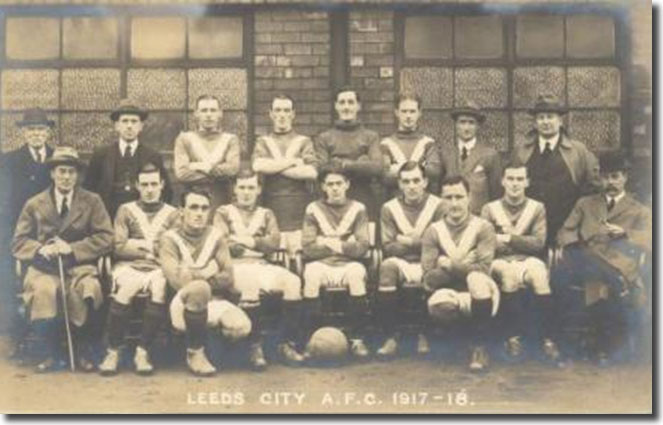 Part
1 1915/16 - Part 2 1916/17 - Part
4 1918/19 - Results and tables
Part
1 1915/16 - Part 2 1916/17 - Part
4 1918/19 - Results and tables
The Leeds City side that began the 1917/18 campaign, the third
organised under wartime conditions, showed few changes from that
which ended the previous season. Their five guests from the North
East, Billy Hampson, Harry
Sherwin, Bob Hewison, Jack Peart and Clem Stephenson, continued
to form the core of the side and the Northampton Town outside-right,
Corporal P J Barrett,
was the only genuine newcomer.
Tommy Lamph had returned from a season spent assisting Rotherham,
Willis Walker was making his first appearance in goal since January
and Jack Hampson his first since March. Tom
Cawley and Stan Robinson
completed the eleven, having played a handful of games between
them in the closing weeks of the previous season. Inside-left
Arthur Price, on holiday in Lincolnshire, was the one notable
absentee on the opening day.
The first game of the season, on 1 September, was against The Wednesday
in Sheffield, but the normal enthusiasm for the start of a new season
was somewhat muted, as noted in the match day programme. 'The strain on
football organisations is severe, and the loyal and whole hearted support
of followers of the game is required more than ever. The decision to keep
football going has been justified, although it has entailed endless worry,
hard work and, in the majority of cases, financial loss. But it has provided
a wholesome recreation for thousands of munition workers and soldiers,
raised big sums for charity; and contributed to the cost of the war through
the entertainment tax.'
The City directors had originally announced that they would not
be competing at all because of the travelling expenses involved
and had only confirmed their agreement to continue operations
in the Midland Principal Tournament three weeks earlier after
strenuous appeals from the League Management Committee. Understandably,
the players were a little rusty when the game commenced, City
enjoying what benefit there was to be derived from the strong
wind.
The Peacocks had the one dangerous effort in the first half hour
with Robinson's shot being diverted by Wednesday keeper Cooper.
The same player shot into the keeper's hands when he led three
forwards in an assault on the Sheffield goal and the game remained
scoreless at the break.
Two minutes after the resumption, City opened the scoring with
their third attack of the half. Peart drove in fiercely from close
range and Cooper could only slow the pace of the ball as it bounced
on into the net. Robinson nearly doubled the advantage a minute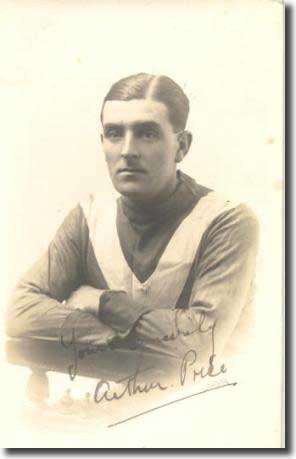 later, but City had some defending to do, surviving a penalty
appeal, before ending victors by a single goal.
later, but City had some defending to do, surviving a penalty
appeal, before ending victors by a single goal.
Clem Stephenson was the best man on show, steering the course
of the game and exhibiting great control of the ball, with admirable
support from Cawley, Jack Hampson and Hewison.
The Football League had opted this season to arrange fixtures
such that the same clubs would face each other on successive Saturdays,
and City thus hosted Wednesday at Elland Road on 8 September.
Though Tom Cawley had signed professional forms for City in 1914,
he had spent most of the war assisting Wednesday; he switched
allegiances for the game, added to the Sheffield ranks in a bid
to strengthen an attack which had been weak at Hillsborough. Arthur
Price replaced him in the City eleven, which was otherwise unchanged.
It was Price who scored the first goal after ten minutes. After
referee Coward dismissed a penalty claim, the inside-left worked
a decent position for himself and fired home left footed. The
goal settled City, and they had an effort disallowed when Peart
drove into the net after an indirect free kick was given against
the goalkeeper for taking too many steps. However, it was the
fortieth minute before they added to their total, Robinson setting
up Stephenson for the second goal. Robinson also made the third,
playing in Price who made it 3-0 at the interval.
back to top
City had things much their own way in the second half: Robinson was again
the architect when Leeds claimed the fourth goal, centring for Peart to
head home five minutes from the end and then Barrett completed a 5-0 victory.
The Leeds Mercury reported: 'There could be no disputing the merit
of the points which were the outcome of artistic passing and forceful
shooting… The City always played like a team confident of victory. The
forwards, well-supported by the half-backs, dominated the situation practically
all through. Peart's distribution was well-nigh perfect, and the whole
time outplayed with rapidity and ease.'
With Willis Walker absent on naval duties the following week,
Blackburn keeper Alf Robinson
stepped up for City's visit to Bradford City, the only change
in the Leeds eleven.
City were outstanding in the first half and after twenty minutes
were two up. Billy Hampson
drove home low from a corner kick and when Bradford keeper Suter
dropped a Robinson centre, Clem Stephenson promptly slipped the
ball home. The home side pulled a goal back just before the break
when centre-forward Cooper, a guest from Newcastle United, ran
through to score.
Early in the second half, referee Shallcross had to warn players
from both sides after there was a display of ill feeling. The
official's intervention had little impact: on the hour, Bradford's
George Wild was sent off after kicking an opponent. Nonetheless,
the ten men of Bradford rallied strongly. Cooper equalised a quarter
of an hour from the end and then Fox scored for the ten men to
end Leeds' unbeaten start.
That was a rare setback in the opening weeks and seven days later
later the Peacocks beat Bradford 4-0 in the return fixture at
Elland Road, thanks to a hat trick from Arthur Price after Jack
Peart had opened the scoring.
They won a further four games on the bounce, scoring sixteen
goals and conceding none, with 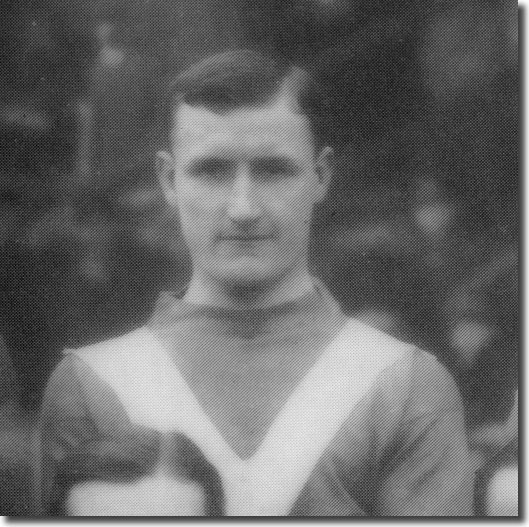 Peart
responsible for five of the scores. Best victory was the 6-0 trouncing
of Rotherham County on 6 October.
Peart
responsible for five of the scores. Best victory was the 6-0 trouncing
of Rotherham County on 6 October.
Price opened the scoring on the half hour with a fierce drive,
and Peart quickly added a second from an Ernie Goodwin cross.
It was left winger Goodwin's first appearance of the season and
just before the break he added the third goal following a dribble
through the County defence.
City took their foot off the gas at that stage, and Rotherham
left winger Billy Hibbert, who would play for City a few months
later, came close to a goal. Hewison was the next goalscorer,
driving home from more than thirty yards. Price got his second
three minutes from time and Peart completed his own brace a couple
of minutes later.
Leeds' 4-0 victory at Lincoln City a fortnight later took the
Elland Road men second in the table, a point behind leaders Sheffield
United.
By now Bob Hewison had moved up to half-back with Jack Hampson
injured, and Leeds-born Fred Baines
established himself as Billy Hampson's partner at full-back, while
Billy's younger brother Tommy took over in goal. Later in the
campaign, the number of Hampsons in City's ranks would swell to
five with the appearances of Walker
Hampson, brother to Billy and Tommy,
and Jack's brother E Hampson,
who had played with him at Northampton.
City's impressive advance was stayed on 27 October when they
were held to a 2-2 draw at home by bottom club Grimsby Town. Leeds
gave debuts on their right flank to Corporal
Walter Grant of the Gordon Highlanders and young Billy Kirton.
Grimsby had attained just one point from their previous six games and
had been expected to be mere cannon fodder, but they played above themselves,
taking a two-goal lead through Goodfellow and Hollings. According to the
Mercury, 'The Leeds City's forwards entirely lacked their usual
power and judgement until near the interval, when Peart scored from a
shot which Sutcliffe had no chance of stopping. Leeds City also forced
two corners which, although well placed, were smartly checked by the Grimsby
backs.
'Grant of Aberdeen and Kirton, a North Eastern League player, who played
on the right, were given few opportunities in the first half, but in the
second half they were prominent in all the Leeds City attacks. It was
from a fine pass by Grant that Peart was able to equalise, and although
Kirton made several praiseworthy efforts to score the Grimsby defence
proved too good for him.'
A week later, Leeds had their revenge, earning a 4-0 victory
at Grimsby, with Arthur Price getting two of the goals to take
his tally to nine from nine appearances.
The Yorkshire Post: 'Leeds City made ample amends at Grimsby for
the surprise draw which the Town team recorded the previous week at Elland
Road. It was a well-merited success, too, though the score was perhaps
more emphatic than the run of play warranted. The City were unquestionably
the better balanced and more polished side, but Grimsby played so strongly
that they could not score, and there was every prospect of the game finishing
goalless when, in the course of an exciting struggle beneath the home
crossbar, Robinson found a loophole in the defence and drove the ball
home. The Town never recovered from this reverse.
back to top
'On the other hand it acted like a tonic on the City raiders, who attacked
with such skill and vigour that three other goals were piled on in four
minutes. City's defence was excellent all through, but most of the credit
of the success must be given to the intermediate men, who alike in attack
and defence were fine. Lamph played brilliantly, and Hewison and Sherwin
were in good form. The forwards 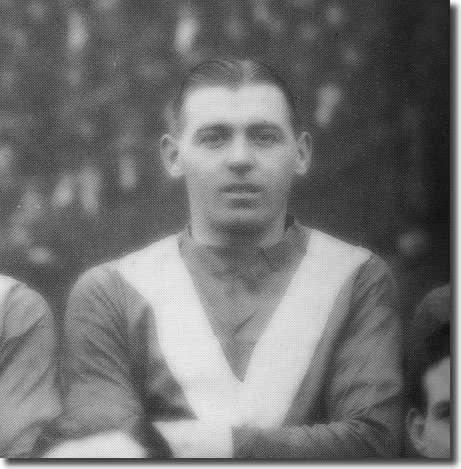 were
fast and kept play open, with long, accurate passes, which harassed the
home defenders sorely. Sutcliffe was the most prominent man in the home
ranks, his goal keeping up to the time of the collapse being superb.'
were
fast and kept play open, with long, accurate passes, which harassed the
home defenders sorely. Sutcliffe was the most prominent man in the home
ranks, his goal keeping up to the time of the collapse being superb.'
Elsewhere that afternoon, Birmingham defeated Sheffield United,
leaving Leeds City topping the table by virtue of a superior goal
average.
On 10 November, Elland Road welcomed that same Birmingham side.
Jack Hampson returned for his first appearance in eight games
and exhibited his versatility by playing at outside-right, partnering
Clem Stephenson, himself playing his first game in three weeks.
Jack Peart opened the scoring for Leeds in the tenth minute,
hooking home a volley after Hewison had chipped the ball into
the Birmingham area. Hampson had a goal disallowed in the second
half for offside and then Price struck the post with Birmingham
down to ten men after losing Claude Jephcott. The Midlanders put
up a strong rearguard action and City were glad to secure the
two points.
They could not repeat the success the following week and went
down 3-1 at St Andrews before a crowd of 26,000.
Again, though, City showed their resilience by setting off on a run of
seven straight victories, commencing against Notts County on 24 November.
The Yorkshire Post: 'Leeds City achieved their victory of 2-0 over
Notts County much more easily than the score would appear to indicate.
As a matter of fact, they were attacking three parts of the game, and,
in defence, the steadiness of their backs, W Hampson and Baines, was sufficient
to cope with any chance development to which the high wind gave rise.
'The City were manifestly superior in all departments and it was only
the tricks of the gale which prevented them winning by a much more decisive
margin. Combination was discounted to a large extent by the wind, which
blew the ball about in eccentric fashion, but the individual cleverness
and resource of such players as Stephenson, Peart and Hewison gave the
home team a commanding advantage, and proved the deciding factor. Corporal
Grant, an Aberdonian from a Yorkshire military camp, made his second appearance
in the City forward line - this time on the left wing - and whilst his
judgement left something to be desired, he showed dashing qualities which
put the visitors' defence in many a tight corner.'
City completed the double over County by beating them 4-2 on
their own ground on 1 December, the points taking them level with
Sheffield United at the top of the table as the Blades lost 3-1
at Huddersfield. The two teams had opened out a clear five-point
lead over the chasing pack with half the games played, and City
moved two clear of their rivals a week later. With four Hampsons
in their team on 8 December, they won 4-3 at Barnsley while Sheffield
lost 2-0 at Bradford Park Avenue.
City had dropped just five points from fifteen games played and
boasted a goals record of 46-13. Jack Peart scored twice at Barnsley
to take his season's tally to 16, while Arthur Price had ten to
his credit. For City loyalists, this was beyond their wildest
dreams; nothing seemed beyond their favourites, with their brand
of free-flowing, attacking football.
On 15 December, Barnsley put up a remarkably good fight in the
Elland Road return, given that they were without three of their
best players in Wigmore, Donkin and Keenlyside and had to rely
on three substitutes picked up locally. Nevertheless, City were
the better side, adapting well to the heavy conditions. They went
close several times before Barnsley snatched a shock goal to open
the scoring on the half hour, Roe scoring from a perfect centre
by Birks. City levelled within five minutes through Peart and
then went ahead when Hewison followed up after an unsuccessful
effort by Stephenson. There were no further goals with City dominating
to secure the 2-1 victory in semi-darkness.
City's Christmas Day game with Huddersfield Town at Elland Road
was even for the first quarter of an hour; then Price put Leeds
ahead and Sherwin doubled their lead from the penalty spot. Hewison
completed the 3-0 victory in the 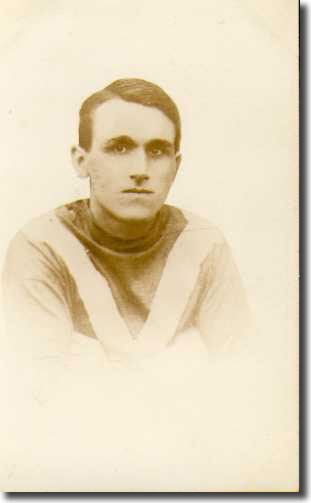 second
half.
second
half.
City won 3-1 in the Boxing Day return to retain their leadership
of the division.
Sheffield United beat Barnsley 3-0 on 29 December to draw level
on points with City, who had the day off and now had two games
in hand on their rivals. They faced Hull at Anlaby Road on 5 January,
the home side undefeated on their own enclosure since 22 September.
Welsh full-back Harry Millership of Blackpool, had made his City
debut on Christmas Day, and was recalled for the game; following
a sound performance against the Tigers he would miss just three
games in the rest of the campaign.
Half-beck Edelston deputised in goal for Hull and the handicap
was crucial, the stand in making no effort to stop the first goal,
scored by Price after twelve minutes. He improved thereafter but
was unable to prevent Clem Stephenson completing a 2-0 victory
in the second half.
Even when Hull managed a 3-1 victory at Elland Road on 12 January,
Leeds remained a couple of points clear of Sheffield United, though
they had exhausted their games in hand. It was City's first home
reverse, but they completed the ninth victory on their travels
when they secured a 4-2 victory against Leicester Fosse a week
later, with two goals from Tom Cawley and other efforts from Harry
Sherwin and Clem Stephenson. The victory ensured they maintained
their place at the head of the table.
back to top
The Peacocks went even better the following week against Fosse at Elland
Road, running out 4-0 victors, as reported by the Leeds Mercury:
'The first half was keen and fast, and Leicester Fosse put up a remarkably
good fight until Price scored from a corner kick taken by Cawley. Leeds
City deserved the goal, which came as a reward of admirable perseverance.
For thirty minutes they practically kept Leicester Fosse on the defensive,
but it was in front of their own goal that Leicester were seen at their
best.
'The entire Fosse defence held out magnificently for half an hour against
a clever, formidable vanguard. The half-backs seemed thoroughly conversant
with the methods of the Leeds City forwards, and intercepted many passes.
Draycott and Gettins, behind, tackled fearlessly and cleared with power.
They could not, however, altogether cope with the individual smartness
of Leeds City forwards, who got several good shots, only to find Bown
consistent with the rest of the defence. Leeds City, however, pursued
their task with skill and confidence, and scored again through Peart before
the interval, following a movement in which excellent understanding was
a prime feature.
'Play in the second half slackened down and there were times when the
Leicester Fosse forwards - who altogether gave a very moderate display
- did as well as those of Leeds City. The Leicester defence, however,
showed signs of their earlier strain, and gradually lost their grip on
the game. After a tricky piece of work on the part of Hewison, Goodwin
added a third goal, and after Peart had missed an open goal, Clem Stephenson
scored the fourth goal, following a cleverly engineered movement in which
the half-backs combined effectively.'
With Sheffield United losing by a single goal at home to Hull,
the victory served to extend City's leadership of the division
to four points.
When City hosted Nottingham Forest on 2 February, they were able
to field the celebrated Sunderland and England forward Charlie
Buchan on the right wing.
Forest were not so blessed, and at one time it seemed their side
would consist of seven men and a substitute drawn from the crowd.
In the end, they managed to scrape together a full eleven, including
City winger E Hampson. The mist was so dense that it seemed the
game might not even commence and play was limited to seventy minutes.
The first half ended without a goal but immediately upon the
resumption, Forest defender Wightman deflected an 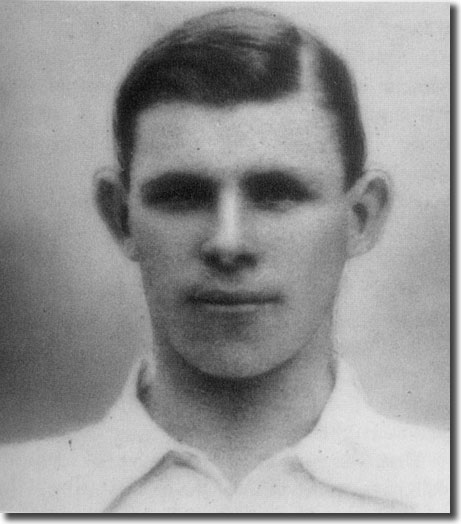 Ernie
Goodwin cross past his own keeper.
Ernie
Goodwin cross past his own keeper.
Buchan wrapped up the points near the end, capitalising on good play
by Arthur Price to break down the right and fire left footed past keeper
Johnson. The Mercury described Buchan as 'certainly the best of the Leeds
City forwards, and it was his skilful touches and expert command in the
City raids, that turned the failing power of the City attack'.
City were hopeful that Buchan would continue to assist their
cause but that was his only appearance for the club; he would
go on to enjoy huge success under Herbert Chapman at Arsenal.
Jack Peart scored the only goal of the game when the two sides met a
week later at the City Ground. The Leeds Mercury: 'Both sides exhibited
pace and enthusiasm, and while the wind made the ball difficult to control,
some brilliant football was displayed. The winning of the toss made all
the difference to Leeds; they had the wind behind them, and at the end
of eleven minutes J Hampson made a brilliant solo run to finish with a
centre which left C Stephenson in possession half a dozen yards from Johnson.
Finding himself covered, however, by Jones, the inside-right deftly touched
the ball back to Peart, who found the mark with an irresistible shot.
'Twice later Peart had possible openings, but he was carefully shadowed
by Wightman. Once, however, he was only inches wide with a flying header.
Forest had more of the game towards the interval, but the City defence
allowed them no room. Forest had to fight every inch of the ground, and
the only time T Hampson was troubled was as the result of a sparkling
shot from Burton.
'Peart led the attack wonderfully well, and Stephenson was a great assistant.
Both wingers were difficult to hold, but the City's real strength was
at half-back and full-back. Both defences, in fact, were magnificent.
Leeds, however, always held a distinct advantage because of their superior
attack. Towards the end Forest rallied with vigour, and it was then that
Hewison and Co were seen at their best. Hewison was only just checked
in time by Millership on one occasion and while Forest's appeal for a
penalty was in vain, the honours were worthily won by a fine side.'
City's preparations for the game had been disrupted by off field
disputes involving acting manager George Cripps.
When Cripps took responsibility for secretarial duties and then
assumed control of team selection after the temporary departure
of Herbert Chapman, it led to disagreements behind the scenes.
Chairman Joseph Connor and another director, J C Whiteman, had
heretofore selected the team and resented their authority being
usurped. Connor was also less than enamoured with the way that
Cripps handled the club's finances. In 1917, the book-keeping
duties were handed over to an accountants' clerk, but Cripps remained
in charge of the team and correspondence.
back to top
The disharmony between Connor and Cripps caused friction with
the players, who had a low opinion of Cripps. Before the match
at the City Ground, Jack Hampson wrote to the directors threatening
that the players would go on strike if Cripps travelled with the
team. Fearful of the consequences of the action, Connor was able
to quell the dispute, but the tense atmosphere continued.
It was surprising that the players could keep their act together
so resolutely while such unrest simmered in the 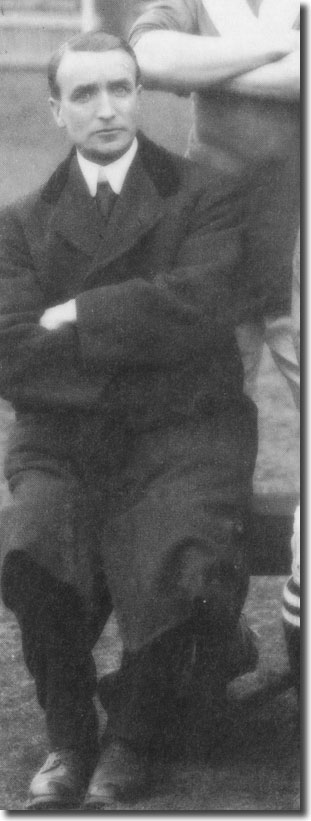 background.
background.
City's only rivals for the title were Sheffield United, 2-1 victors
at Leicester, but City were now four points clear with four games
remaining.
On 16 February, Leeds beat Bradford Park Avenue 2-1 with goals from Tom
Cawley and Clem Stephenson. The Yorkshire Post was ecstatic: 'Their
performance on their own ground was worthy of the reputation which they
established for themselves in the last two seasons. Indeed, the result
… by no means represents the extent of the winners' superiority. Actually,
the City goalkeeper was only called upon to handle the ball three times
in the course of the match, and the goal which Bradford scored near the
finish was a palpable fluke. For the rest, Leeds City absolutely dominated
the play.
'Their inside-forwards - Stephenson, Peart and Price - completely overran
the Bradford half-backs, and it was only the stout defence of Blackham
and Dickenson, backed by brilliant goalkeeping on the part of Howling
that saved Bradford from an overwhelming defeat. Hewison, as ever, was
a clever organiser of most of the attacks, and the much-improved Cawley
at right wing was concerned in both the City goals, scoring the first
himself, giving Stephenson the chance of the other. J Hampson demonstrated
his versatility by playing a serviceable game at left wing, his display
in that position being much ahead of one or two performances which on
an emergency he has given on the City ground.'
That same afternoon at Bramall Lane, Sheffield United were beaten
1-0 by Forest; it would now take a miracle for the Blades to overtake
City, though the two sides were pitted against each other in the
final two games of the season.
City made sure there would be no photo finish, beating Park Avenue
2-0 in Bradford on 23 February. They were somewhat fortunate to
secure the victory, having been outplayed in the first half and
could have been two or three down. But Harry Sherwin opened the
scoring from the penalty spot before the break and five minutes
after the restart Jack Peart scored his twentieth goal of the
season to secure both the points and the title.
On 2 March, Leeds faced Sheffield United at Bramall Lane before
a crowd of 18,000. For once City were second best, losing for
the first time in seven games to an outstanding Blades side.
Jack Hampson had been due to play on the left wing, but failed
to turn up and City had to enlist the services of Blades winger
Spratt, who was in the stadium, and had been featuring for Rotherham
County.
The newcomer laid on an opening for Cawley after nine minutes
and when the first shot was partly cleared, Hewison hammered home
the rebound to put City ahead.
Sheffield equalised three minutes into the second half in a bizarre
fashion. City keeper Tommy Hampson came out to meet Blades centre-forward
Johnson as he ran through and when he blocked the shot it rebounded
off the hapless Hewison and into the net.
Seventeen minutes from the end, Sheffield won the game when Shearman
drove home a loose ball.
The Elland Road return kicked off half an hour late in front
of a crowd of 18,000. City found their form and won by way of
first half goals from Tom Cawley and Clem Stephenson. It was a
keenly-fought contest with Harry Millership and Blades half-back
Pantling both sent off.
The victory left City six points clear of Sheffield United and
confirmed them as the finest side in the section.
For this particular season, the Football League decided that
the winners of the Lancashire and Midland sections should meet
each other on a home and away basis for the privilege of being
crowned League champions. This was first suggested the previous
October, when the Emergency Committee of the Football Association
also proposed a modification of the rule prohibiting the award
of cups and medals during wartime. The decision was confirmed
in February with the proceeds earmarked for the National Football
War Fund.
In the Lancashire section, Stoke came through in the closing
stages of the campaign to overtake long time leaders Liverpool
and would be City's opponents in the two-legged play off.
Before then, Leeds had to complete six games in the Subsidiary
Tournament against Huddersfield Town and the two Bradford clubs.
Often there was an air of anti-climax about these end of season
affairs, but for once City carried their form through into the
Subsidiary games.
They lost their first fixture, 4-2 at Huddersfield on 16 March,
but then quickly clicked back into gear. With Jack Peart unavailable,
Jack Hampson filled in at centre-forward at Leeds Road, but in
the Elland Road return, City had Newcastle
United centre-forward Rutherford leading the line. The player
missed two chances in the first half but played well and City
should really have been ahead long before Clem Stephenson scored
the only goal with ten minutes remaining.
Jack Hampson took up the centre-forward role again on 30 March when City
faced Bradford at Elland Road. Arthur Price scored twice and Stephenson
once as Leeds won 3-1.
back to top
When the teams met a week later at Bradford, City had another
new centre-forward, Andy Wilson
of Middlesbrough, who had been playing North of the Border with
Hearts and who would later win full caps for Scotland. Also in
the side at full-back was Walker Hampson, brother to Tommy and
Billy.
In a game played in incessant rain, Wilson had a goal disallowed
for offside in the first half and five minutes after the restart
he scored after being played in by Tom Cawley. Wilson quickly
added a second to secure the points.
Wilson led the line again, at home to Bradford City on 13 April,
but the game finished without a goal, as did the return a week
later at Valley Parade, with Jack Peart restored up front.
It was a drab finish to the tournament, but enough to see City
head the four-club table, a point clear of runners up Huddersfield.
With the play off games with Stoke scheduled for May, City kept their
hands in with a charity match against a combined Manchester City and Manchester
United team on 27 April. There was a crowd of over 12,000 to witness the
game which the Yorkshire Post described as 'fast and exciting'.
City acquitted themselves well early doors, but the celebrated
Welsh international Billy Meredith gave the Mancunians a first
half lead and they went on to complete a 3-0 victory after the
break.
On 4 May, City faced Stoke in
their first play off game at Elland Road. They had to take
the field without Clem Stephenson, called away by the military
and based now at Crystal Palace. Tom Cawley took Stephenson's
place at inside-right and England international Billy Hibbert
of Newcastle United and Rotherham County came in on the left wing.
In a well-contested game between two gifted sides, City took
the initiative in the first half with goals from Hibbert and Peart.
The Peacocks had to withstand some fierce second half pressure
from the Potters, but did so resolutely to preserve their advantage.
The same City eleven took the
field at the Victoria Ground on 11 May, but Bob Hewison limped
out of the action in the first half. The Peacocks consequently
had to fight a strong rearguard action as Stoke went onto all-out
attack. They withstood all that was thrown at them until twelve
minutes from the end, when they conceded a penalty which Parker
converted to set up a tense and exciting conclusion.
City were resolute, refusing to be breached a second time, and
saw out the game to earn a 2-1 aggregate victory which ensured
that they would carry off the crown of unofficial League champions.
It was a heart-warming climax to a season of phenomenal achievement
for Leeds City, confirming the newly-established status of a club
that had only been in existence for 14 years. The triumph would
go unmarked in the official records of the Football League, but
in the spring of 1918, City could congratulate themselves on having
reached the very pinnacle of the English game.
There were signs at the time that the First World War was drifting
to a conclusion. After remaining neutral until April 1917, the
United States finally threw themselves fully into support of the
Allies in the spring of 1918. The American contribution was decisive
in advancing the end of the conflict.
President Woodrow Wilson made his 'Fourteen Points' speech to the US
Congress on 8 January 1918. The address was intended to reassure the American
public that the Great War was being fought for a moral cause and for post-war
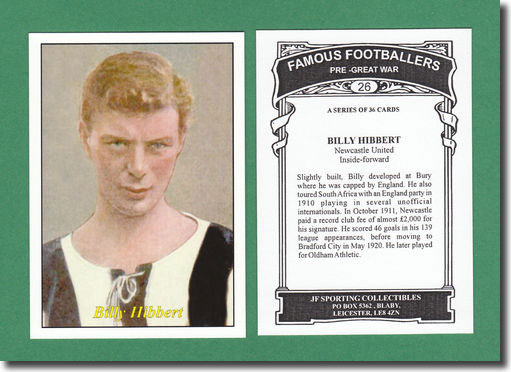 peace
in Europe. Wilson followed with the 'Four Principles' speech on 11 February.
peace
in Europe. Wilson followed with the 'Four Principles' speech on 11 February.
On 25 May, German U-boats appeared in US waters for the first
time and three days later American forces were victorious in their
first major action, at the Battle of Cantigny.
The Second Battle of the Marne, the last major German offensive,
began on 15 July. It failed when an Allied counter attack overwhelmed
the Germans, inflicting severe casualties, and this marked the
start of the Allied advance which ended with the Armistice in
November.
Anticipating the coming of peace, the Football League held its
annual general meeting at the Grand Hotel in Manchester on 15
July. John McKenna, President of the League, opened proceedings
by making special reference to the defeat of the "vile conspiracy
that was running rampant all last season", ending in the successful
prosecution of a player for bribery. The Management Committee
made no recommendation as to the grouping of clubs for the new
season.
Future Leeds City manager, Arthur
Fairclough, then secretary-manager of Huddersfield Town, suggested
that the Lancashire and Midlands Sections should be divided into
three for convenience of travelling, and that competitions should
be arranged up to Christmas, these to be duplicated if the war
continued after that period.
In the end, however, arrangements would remain as before for
1918/19, with City in a Midland
Section of sixteen clubs, followed by a Subsidiary Tournament
of four clubs from the West Riding.
back to top
Part 1 1915/16 - Part
2 1916/17 - Part 4 1918/19 - Results and tables












 Part
1 1915/16 - Part 2 1916/17 - Part
4 1918/19 - Results and tables
Part
1 1915/16 - Part 2 1916/17 - Part
4 1918/19 - Results and tables later, but City had some defending to do, surviving a penalty
appeal, before ending victors by a single goal.
later, but City had some defending to do, surviving a penalty
appeal, before ending victors by a single goal. Peart
responsible for five of the scores. Best victory was the 6-0 trouncing
of Rotherham County on 6 October.
Peart
responsible for five of the scores. Best victory was the 6-0 trouncing
of Rotherham County on 6 October. were
fast and kept play open, with long, accurate passes, which harassed the
home defenders sorely. Sutcliffe was the most prominent man in the home
ranks, his goal keeping up to the time of the collapse being superb.'
were
fast and kept play open, with long, accurate passes, which harassed the
home defenders sorely. Sutcliffe was the most prominent man in the home
ranks, his goal keeping up to the time of the collapse being superb.' second
half.
second
half. Ernie
Goodwin cross past his own keeper.
Ernie
Goodwin cross past his own keeper. background.
background. peace
in Europe. Wilson followed with the 'Four Principles' speech on 11 February.
peace
in Europe. Wilson followed with the 'Four Principles' speech on 11 February.